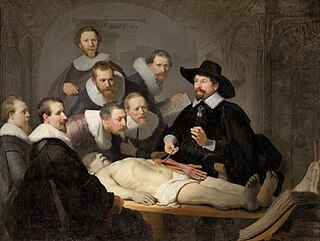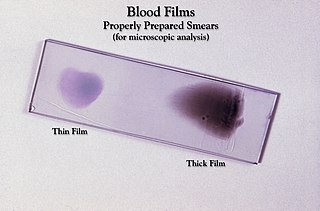
Pathology is the study of the causes and effects of disease or injury. The word pathology also refers to the study of disease in general, incorporating a wide range of biology research fields and medical practices. However, when used in the context of modern medical treatment, the term is often used in a narrower fashion to refer to processes and tests that fall within the contemporary medical field of "general pathology", an area which includes a number of distinct but inter-related medical specialties that diagnose disease, mostly through analysis of tissue, cell, and body fluid samples. Idiomatically, "a pathology" may also refer to the predicted or actual progression of particular diseases, and the affix pathy is sometimes used to indicate a state of disease in cases of both physical ailment and psychological conditions. A physician practicing pathology is called a pathologist.

An autopsy is a surgical procedure that consists of a thorough examination of a corpse by dissection to determine the cause, mode, and manner of death or to evaluate any disease or injury that may be present for research or educational purposes.. Autopsies are usually performed by a specialized medical doctor called a pathologist. In most cases, a medical examiner or coroner can determine the cause of death. However, only a small portion of deaths require an autopsy to be performed, under certain circumstances.

The Journal of the American Medical Association (JAMA) is a peer-reviewed medical journal published 48 times a year by the American Medical Association. It publishes original research, reviews, and editorials covering all aspects of biomedicine. The journal was established in 1883 with Nathan Smith Davis as the founding editor. Kirsten Bibbins-Domingo of the University of California San Francisco became the journal editor-in-chief on July 1, 2022, succeeding Howard Bauchner of Boston University.

Stephen Joel Barrett is an American retired psychiatrist, author, co-founder of the National Council Against Health Fraud (NCAHF), and the webmaster of Quackwatch. He runs a number of websites dealing with quackery and health fraud. He focuses on consumer protection, medical ethics, and scientific skepticism.

The medical examiner is an appointed official in some American jurisdictions who is trained in pathology that investigates deaths that occur under unusual or suspicious circumstances, to perform post-mortem examinations, and in some jurisdictions to initiate inquests.

Ernest William Goodpasture was an American pathologist and physician. Goodpasture advanced the scientific understanding of the pathogenesis of infectious diseases, parasitism, and a variety of rickettsial and viral infections. Together with colleagues at Vanderbilt University, he invented methods for growing viruses and rickettsiae in chicken embryos and fertilized chicken eggs. This enabled the development of vaccines against influenza, chicken pox, smallpox, yellow fever, typhus, Rocky mountain spotted fever, and other diseases. He also described Goodpasture syndrome.
Medscape is a website providing access to medical information for clinicians; the organization also provides continuing education for physicians and health professionals. It references medical journal articles, Continuing Medical Education (CME), a version of the National Library of Medicine's MEDLINE database, medical news, and drug information. At one time Medscape published seven electronic peer reviewed journals.
A medical specialty is a branch of medical practice that is focused on a defined group of patients, diseases, skills, or philosophy. Examples include those branches of medicine that deal exclusively with children (paediatrics), cancer (oncology), laboratory medicine (pathology), or primary care. After completing medical school or other basic training, physicians or surgeons and other clinicians usually further their medical education in a specific specialty of medicine by completing a multiple-year residency to become a specialist.

Clinical pathology is a medical specialty that is concerned with the diagnosis of disease based on the laboratory analysis of bodily fluids, such as blood, urine, and tissue homogenates or extracts using the tools of chemistry, microbiology, hematology, molecular pathology, and Immunohaematology. This specialty requires a medical residency.

Eugene Lindsay Opie was an American physician and pathologist who conducted research on the causes, transmission, and diagnosis of tuberculosis and on immunization against the disease. He served as professor of pathology at several U.S. medical schools and as Dean of the Washington University School of Medicine.
"Gay bowel syndrome" is an obsolete classification of various sexually transmitted rectal infections observed in men who have sex with men. It was first used by Dr. Henry L. Kazal in 1976 to describe conditions he observed in his proctology practice, which had many gay patients. The term has fallen into disuse, as both clinically imprecise and prejudicial: the issues it describes are not specific to gay and bisexual men, limited to the bowel, nor a medical syndrome.

Juan Rosai was an Italian-born American physician who contributed to clinical research and education in the specialty of surgical pathology. He was the principal author and editor of a major textbook in that field, and he characterized novel medical conditions such as Rosai-Dorfman disease and the desmoplastic small round cell tumor. Rosai is also well-known because of his role as teacher, mentor and consultant to many American and international surgical pathologists.

William Clifford Roberts is an American physician specializing in cardiac pathology.
Clinical peer review, also known as medical peer review is the process by which health care professionals, including those in nursing and pharmacy, evaluate each other's clinical performance. A discipline-specific process may be referenced accordingly.
Louis Blanchard Wilson was an American pathologist and the chief of pathology at Mayo Clinic from 1905 to 1937. Wilson is most famous for initiating the routine use of the frozen section procedure for rapid intraoperative diagnosis.
Simeon Burt Wolbach was an American pathologist, researcher, teacher, and journal editor who elucidated the infection vectors for Rocky Mountain spotted fever and epidemic typhus. He was president of the American Association of Pathologists and Bacteriologists and of the American Society for Experimental Pathology.
A general medical journal is an academic journal dedicated to medicine in general, rather than a specific field of medicine.
Douglas Alexander Mata is an American pathologist and epidemiologist currently at Foundation Medicine, Inc. in Cambridge, Massachusetts, known for his contributions to molecular pathological epidemiology and neuropsychiatric epidemiology. His textbook Statistics for Pathologists is a reference text in pathology medical education and his meta-analytical studies on physician mental health have circulated widely in the popular press.

Frederick William Sunderman was an American physician and scientist who worked in the fields of laboratory medicine, clinical chemistry and toxicology. He completed his undergraduate education at Gettysburg College and earned an MD and PhD from the University of Pennsylvania. From 1936 to 1948 he carried out research on laboratory methods and quality control at the William Pepper Laboratory of the University of Pennsylvania. During World War II, he worked for the Manhattan Project. In 1949, he established a proficiency testing service for medical laboratories which operated until 1985. He was elected president of the American Society of Clinical Pathologists in 1950. In 1971, Sunderman founded the Annals of Clinical and Laboratory Science and would serve as editor-in-chief of the journal until 1999.
Albert Balows was an American clinical microbiologist. He was the president of the American Society for Microbiology in 1981.










